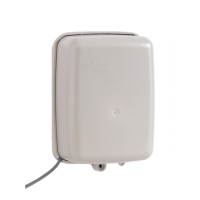Page 20
Appendix D - RF Antenna Best Practices
The following section highlights best practices for installing the antennas:
- Mount antennas as high as possible, in a location which provides clear line-of-sight (LOS) to connecting
devices. Note:
o Nearby objects, including the antenna’s supporting structure can change the antenna pattern and
cause areas of limited coverage
o Water towers often block the line of sight path between antenna and the connecting devices,
reducing coverage in some directions.
o On traditional 3-leg and 4-leg towers, the standoff mount for the antenna must position the
antenna at least 5 feet away from the tower to minimize coverage area problems
- The Neptune RF antennas should have a minimum horizontal separation of 6 feet (1.8 meters). Maximum
performance is achieved by a horizontal separation of approximately 12-20 feet (3.6 to 6 meters).
- For sites with multiple antennas, mount the antennas one above the other if possible. Separate each
antenna by 10 (3 meters) feet to minimize interference.
- Antenna sites that must share space with multiple transmitting systems may require additional equipment
to protect the systems from interfering with each other. These sites could also require additional
engineering to make them perform well
- Managed antenna sites can require additional equipment and might dictate how an installation is to be
performed. Follow the site's requirements if the installation meets Neptune's minimum requirements.
- The antenna must be carefully hoisted up the tower so that it is not damaged.
- The feed line should not be attached to the antenna while it is being hoisted up the tower or other
supporting structure. The feedline should be attached after the antenna is in place.
- The antenna connector must not be damaged during installation. A damaged connector can result in
additional signal loss or complete failure of the RF connection.

